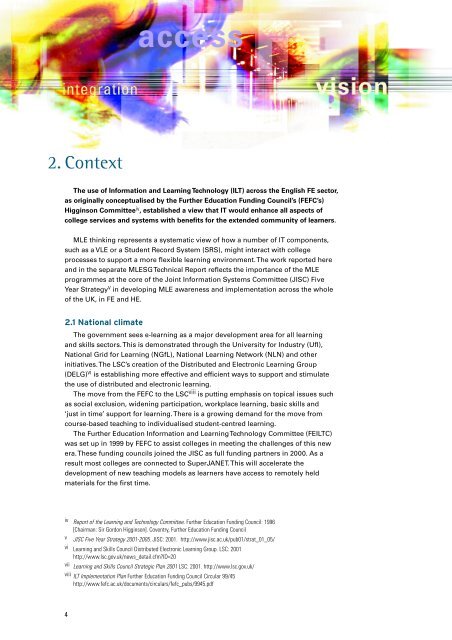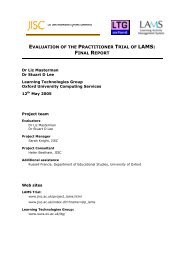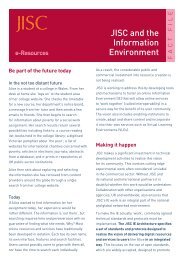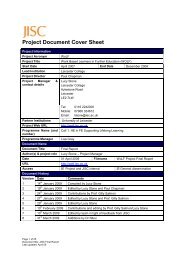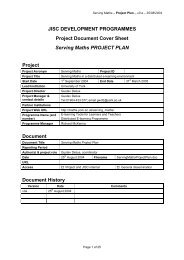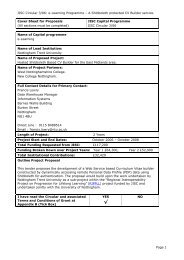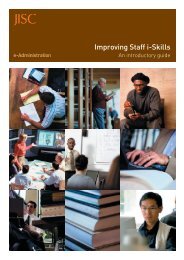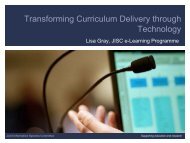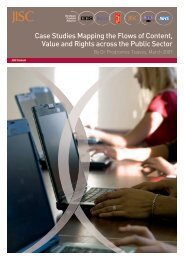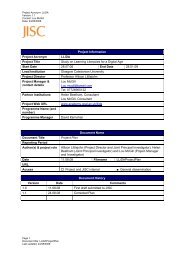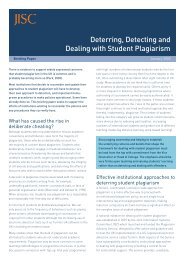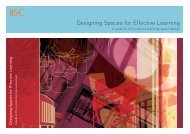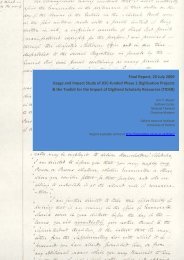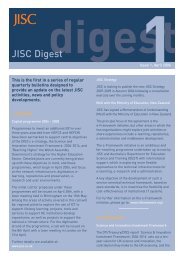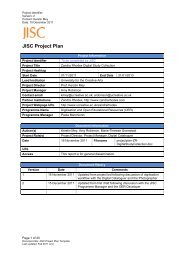Managing the future with MLEs - Jisc
Managing the future with MLEs - Jisc
Managing the future with MLEs - Jisc
Create successful ePaper yourself
Turn your PDF publications into a flip-book with our unique Google optimized e-Paper software.
2. Context<br />
The use of Information and Learning Technology (ILT) across <strong>the</strong> English FE sector,<br />
as originally conceptualised by <strong>the</strong> Fur<strong>the</strong>r Education Funding Council’s (FEFC’s)<br />
Higginson Committee iv , established a view that IT would enhance all aspects of<br />
college services and systems <strong>with</strong> benefits for <strong>the</strong> extended community of learners.<br />
MLE thinking represents a systematic view of how a number of IT components,<br />
such as a VLE or a Student Record System (SRS), might interact <strong>with</strong> college<br />
processes to support a more flexible learning environment. The work reported here<br />
and in <strong>the</strong> separate MLESG Technical Report reflects <strong>the</strong> importance of <strong>the</strong> MLE<br />
programmes at <strong>the</strong> core of <strong>the</strong> Joint Information Systems Committee (JISC) Five<br />
Year Strategy v in developing MLE awareness and implementation across <strong>the</strong> whole<br />
of <strong>the</strong> UK, in FE and HE.<br />
2.1 National climate<br />
The government sees e-learning as a major development area for all learning<br />
and skills sectors. This is demonstrated through <strong>the</strong> University for Industry (UfI),<br />
National Grid for Learning (NGfL), National Learning Network (NLN) and o<strong>the</strong>r<br />
initiatives. The LSC’s creation of <strong>the</strong> Distributed and Electronic Learning Group<br />
(DELG) vi is establishing more effective and efficient ways to support and stimulate<br />
<strong>the</strong> use of distributed and electronic learning.<br />
The move from <strong>the</strong> FEFC to <strong>the</strong> LSC viii is putting emphasis on topical issues such<br />
as social exclusion, widening participation, workplace learning, basic skills and<br />
‘just in time’ support for learning. There is a growing demand for <strong>the</strong> move from<br />
course-based teaching to individualised student-centred learning.<br />
The Fur<strong>the</strong>r Education Information and Learning Technology Committee (FEILTC)<br />
was set up in 1999 by FEFC to assist colleges in meeting <strong>the</strong> challenges of this new<br />
era. These funding councils joined <strong>the</strong> JISC as full funding partners in 2000. As a<br />
result most colleges are connected to SuperJANET. This will accelerate <strong>the</strong><br />
development of new teaching models as learners have access to remotely held<br />
materials for <strong>the</strong> first time.<br />
iv Report of <strong>the</strong> Learning and Technology Committee. Fur<strong>the</strong>r Education Funding Council: 1996<br />
[Chairman: Sir Gordon Higginson]. Coventry, Fur<strong>the</strong>r Education Funding Council<br />
v JISC Five Year Strategy 2001-2005. JISC: 2001. http://www.jisc.ac.uk/pub01/strat_01_05/<br />
vi Learning and Skills Council Distributed Electronic Learning Group. LSC: 2001<br />
http://www.lsc.gov.uk/news_detail.cfm?ID=20<br />
vii Learning and Skills Council Strategic Plan 2001 LSC: 2001. http://www.lsc.gov.uk/<br />
viii ILT Implementation Plan Fur<strong>the</strong>r Education Funding Council Circular 99/45<br />
http://www.fefc.ac.uk/documents/circulars/fefc_pubs/9945.pdf<br />
4


